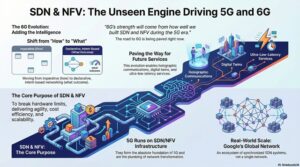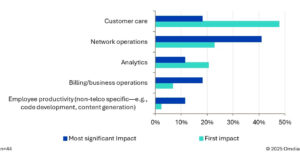The telecom sector has consistently driven transformative changes that have reshaped human life. The ability to connect and share information effortlessly has fueled significant innovation throughout history. In 2024, as we navigate an increasingly hyper-connected world, telecom operators are at the forefront, facilitating communication and digital services on a global scale. Their diverse offerings cater to a broad range of customers, from individual consumers to large enterprises and government bodies. Gaining a clear understanding of these services and the various customer segments they serve is key to recognizing the strategic importance of telecom operators in today’s digital landscape.
Consumer Services: Connecting Individuals and Homes
For the average consumer, telecom operators are the backbone of daily communication and digital entertainment. The most recognizable services fall under this category, aimed at individual users and households.
- Mobile Services:
- Voice and SMS: Traditional voice calls and text messaging services.
- Mobile Data: Internet access through 3G, 4G, and 5G networks, enabling web browsing, social media, streaming, and other online activities.
- Value-Added Services (VAS): Services like mobile TV, ringtones, cloud storage, gaming, and mobile wallet/payment services.
- Fixed-Line Services:
- Broadband Internet: High-speed internet access via DSL, fiber, or cable.
- Landline Telephone: Traditional voice services over a fixed line.
- VoIP Services: Voice over IP services allowing voice calls over the internet.
- Television and Entertainment:
- IPTV and Cable TV: Television services delivered over internet protocols or traditional cable.
- Streaming Services: Partnerships with streaming platforms or own-branded streaming services offering movies, TV shows, and live events.
- Bundled Services:
- Triple/Quad Play: Bundles that combine mobile, fixed-line, broadband, and television services at a discounted rate.
- IoT and Smart Home Solutions:
- Connected Devices: Services for managing smart devices such as home security systems, smart lighting, and energy management systems.
- Wearables: Connectivity services for wearable devices like smartwatches.
Enterprise Services: Empowering Businesses with Advanced Connectivity
Beyond individual consumers, telecom operators provide an extensive range of services tailored for businesses. These enterprise services are crucial for companies of all sizes, enabling them to operate efficiently in a digital-first world.
- Mobile and Fixed Connectivity:
- Corporate Mobile Plans: Tailored mobile plans for businesses, often with added security, data management, and unified communications features.
- Dedicated Internet Access: High-speed, dedicated internet connections for businesses.
- Cloud Services:
- Cloud Computing: Infrastructure-as-a-Service (IaaS), Platform-as-a-Service (PaaS), and Software-as-a-Service (SaaS) offerings for businesses to host and run their applications and services.
- Cloud Storage: Secure cloud storage solutions for data backup and recovery.
- Managed IT Services:
- Managed Networks: Outsourcing network management and maintenance to telecom operators.
- Security Services: Cybersecurity services including firewalls, VPNs, DDoS protection, and threat management.
- Data Centers: Colocation services and data center management.
- Unified Communications:
- VoIP and PBX Services: Advanced voice services integrating with enterprise communication systems.
- Collaboration Tools: Video conferencing, messaging platforms, and collaborative workspaces.
- Internet of Things (IoT) Solutions:
- IoT Connectivity: Services to connect and manage IoT devices, including SIM cards for IoT, NB-IoT, and LTE-M networks.
- IoT Platforms: Platforms for managing and analyzing IoT data for applications like fleet management, smart cities, and industrial automation.
- Private 5G and Network Slicing:
- Private Networks: Dedicated 5G networks for enterprises, ensuring high security, low latency, and reliable connectivity.
- Network Slicing: Tailored network slices for specific enterprise needs, allowing customized performance and security.
- Business Continuity and Disaster Recovery:
- Backup and Recovery Services: Ensuring business operations can continue seamlessly in the event of a disaster.
- Business Continuity Planning: Consulting and solutions for business continuity strategies.
Specialized Services: Addressing Niche Needs
Telecom operators also offer specialized services that cater to specific industries or customer segments.
- M2M (Machine-to-Machine) Connectivity: Services for connecting machines and devices across industrial sectors.
- Wholesale Services: Providing network access, bandwidth, and other services to smaller telecom operators, ISPs, and content providers.
- Carrier Services: Interconnection and termination services for other telecom operators.
Diverse Customer Segments: Who Benefits from Telecom Services?
Telecom operators serve a wide range of customers, each with unique needs and expectations.
- Consumers (B2C):
- Individual Users: The general public using mobile, broadband, and entertainment services.
- Households: Families and homes subscribing to bundled services including TV, internet, and home phone services.
- Small and Medium Enterprises (SMEs):
- Local Businesses: Small and medium-sized companies requiring basic connectivity and IT services.
- Retailers and Service Providers: Businesses in need of mobile connectivity, point-of-sale (POS) systems, and cloud services.
- Large Enterprises:
- Corporations: Large companies requiring extensive connectivity, cloud solutions, cybersecurity, and unified communications.
- Financial Institutions: Banks and financial service providers needing secure, reliable, and compliant communication and data services.
- Healthcare Providers: Hospitals and clinics requiring specialized connectivity for telemedicine and healthcare IoT devices.
- Manufacturers: Industrial companies using IoT, private 5G, and M2M communications for automation and smart factory operations.
- Government and Public Sector:
- Public Safety and Emergency Services: Connectivity solutions for police, fire departments, and emergency responders.
- Municipalities: Smart city solutions, public Wi-Fi, and infrastructure projects.
- Educational Institutions: Connectivity and cloud services for schools, colleges, and universities.
- Wholesale Customers:
- ISPs and MVNOs: Internet service providers and mobile virtual network operators who lease network access and services.
- Content Providers: Streaming services and content delivery networks (CDNs) that rely on telecom infrastructure for content distribution.
Conclusion
Telecom operators are much more than providers of voice and data services. They are the backbone of modern communication, offering a wide range of services that cater to consumers, businesses, and specialized sectors. Their offerings are essential for enabling connectivity, driving innovation, and supporting the digital transformation of industries across the globe. As the world becomes increasingly connected, the role of telecom operators in supporting this connectivity will only continue to grow, making them indispensable partners in the digital economy.






Be First to Comment